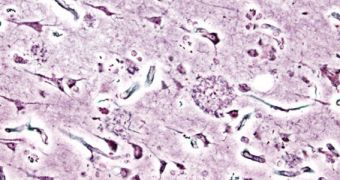Researchers with the VA San Diego Healthcare System discovered in a new study that seniors suffering from high blood pressure are more likely than their healthy peers to exhibit the biomarkers associated with a form of dementia called Alzheimer's disease.
The investigation is important because Alzheimer's is currently one of the fastest-spreading mental illnesses in the world, and also because it targets the elderly. This places extreme pressures on national medical systems, particularly when taking into account the long-term trend of population aging.
For the research, scientists analyzed data from 177 healthy test subjects, aged 55 through 100. The team first measured each participant's blood pressure, and then collected spinal fluid samples, PsychCentral reports.
When cross-referencing the two datasets, it was found that people with the highest blood pressure were more likely to exhibit signs of the beta amyloid protein (a common Alzheimer's biomarker) in their spinal fluid.
“These results suggest that the forces involved in blood circulation may be related to the development of the hallmark Alzheimer’s disease signs that cause loss of brain cells,” says team member Daniel A. Nation, PhD.

 14 DAY TRIAL //
14 DAY TRIAL //